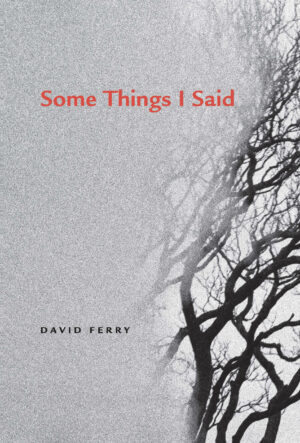Some Things I Said
David Ferry
reviewed by Richard Hoffman
David Ferry’s Some Things I Said opens with the title poem, a reflection on grief and mortality that sifts through Ferry’s body of work. It is a stunning integrated whole and a representation of the poet’s deepest inquiry: ancient, Orphic, and grief-stricken. The poem, and by extension the whole book, is an elegy for the poet’s wife Anne (her photo, faded, a receding Eurydice, occupies the exact center of the book). Throughout the collection, the poet cries out to her, “where are you now, Anne?” It is as if his puzzlement at his beloved’s death is mirrored in his puzzlement at himself and the self. “Who was I?” is the inquiry here. At the end of his life, a man who has given himself to poetry is asking his lifelong query one last time: “what is my name and nature?” Ferry’s question undergirds this poem and governs the collection. The repeated “I was the one who said … ” or “I said … ,” or ” … is what I said,” variously appended to lines from Ferry’s older poems, create a profound force field of reflection.
David Ferry (1924–2023) won the National Book Award in 2012 for Bewilderment: New Poems and Translations. His late public success as a poet was preceded by decades of obscurity. During that time he was beloved by a following of serious readers, many of them other poets. Ferry’s poems and his translations share a single consciousness. As the National Book Foundation says of his translations, “Once his voice takes hold of them they are as bred in the bone as all his other work.” Here, included in Some Things I Said, is a verse from his poem “Ancestral Lines”:
It’s as when following the others’ lines,
Which are the tracks of somebody gone before,
Leaving me mischievous clues, telling me who
They were and who it was they weren’t,
And who it is I am because of them,
Or, just for the moment, reading them, I am
Reading Ferry, if only just for the moment, you are him. It is a moment of bewilderment but in its broadest sense: of wonder, of being rewilded, and reopened to a tragic amazement that is human, animal, existential. Ferry’s work is a conclave of voices—“Through me many long dead voices,” as Whitman wrote—but all of them are his. Ferry echoes, augments, and incorporates the voices of those he has translated: Sîn-lēqi-unninni, the author of Gilgamesh; Horace; Virgil; and others. Some Things I Said is the result of his having schooled himself in the whole history, across millennia and cultures, of the heart’s cry when faced with grief and oblivion. Encountering the question, “where are you now, Anne?” it is hard not to think of Gilgamesh over Enkidu’s body, that tragic amazement at death.
Inevitable then, that there are links to the figure of Orpheus, the first of poets. But this is not the young, innocent, inexperienced Orpheus of the myth, but one stooped beneath the burden of experience, grieving not only for his young and beautiful paramour but his life’s companion. And the poet comes to find that his mourning, grief, and astonishment is in fact his identity, and that his encounter with himself brings him as close as he can come to understanding the contours and character of his individual life:
Right there before my eyes was the one who said
where are you now? Where
are you Anne. I was the one
Widower. Survivor. Scribe. David Ferry was a poet less afraid of mortality than awed by it, bewildered by our corporality even as we dream our lives. Take the poem “Musings of Mind and Body: the Mind,” which ends: “I hum to myself myself in a humming dream.” “Myself” in Ferry’s poems is that part of one’s identity that cries out and is the only part of a person accessible to inquiry. “I wish I could recall now the lines written across my dream is what I said.”
Ultimately, Some Things I Said is a transcendent attempt to answer the troubled and troubling question with which both the title poem and the book itself conclude:
I cried in my mute heart,
What is my name and nature?
It is an attempt that must necessarily fail, but the lyric beauty, the sustained intensity, and the deep resonance of the inquiry fully succeed here in distilling to its essence this American poet’s glorious achievement.
Published on October 8, 2024

